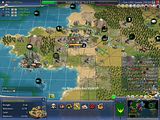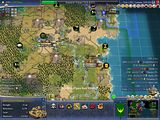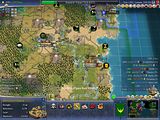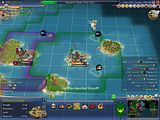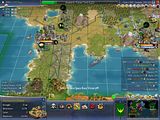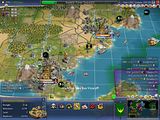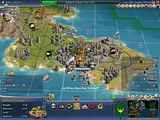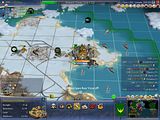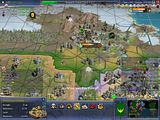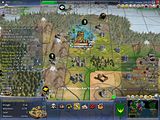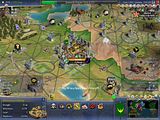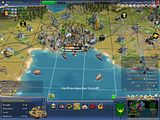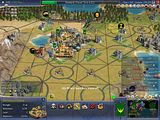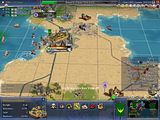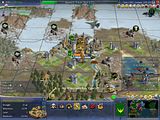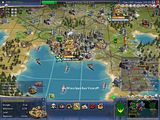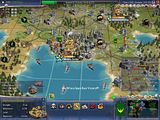I am new to CIV IV so take the following with a grain of salt. I play the Romans. I have learned the following the hard way.
1. Develop a settler first.
At the lower levels of difficulty, the AI is not agressive in the beginning. Civilizations are not agressive, barbarian animals are not allowed within city limits. Soooo - the first unit I build is a settler. It takes time, so far it has paid off. I think this must only be possible at the lower levels of difficulty. Having two cities early really helps with production of units and establishing a solid base for your civilization.
2. After developing the second city, produce at least two military units.
3. Produce barracks in your cities one at a time, then produce at least one more military unit.
4. Produce a worker to connect the cities and imrpove the land.
5. Bee line to your UU unit. The sooner you get it the better off you will be.
6. Grab on to the slavery civic ASAP. It allowes you to sell your unhappy citizens (those ingrates) for production capacity. You can generate a large army in a short time doing this. They can also be sold for city improvements. I love slavery in the early going.
7. Never allow the AI civilizations open borders while you are staking out your territory and developing your civilization. Use open borders with care. I have had that nasty old AI send a settler and escorts through my territory and establish a city at a really bad spot for me.
8. Build military.
9. Kill off any city established within what you consider your territory or a stragegic resouce near you ASAP. Small cities should be destroyed and a settler used to establish your own city. Reestablish the city immediately, otherwise the AI will be back. Also have a force large enough to hold what you have taken. The AI doesn't like to lose cities. He will be back.
10. Never never accept peace terms from the AI. The AI will not ask for peace unless he is getting killed or needs time to regroup. Every time I have accepted peace terms from the AI, I have regretted it. The AI will use the peace to reestablish a city where he lost one, or discover his magical unit and come after you with a vengence.
11. If you do accept peace, build up your army.
12. Discover sailing and sailing tech. He or she who controls the ocean owns the mid and possibly end game.
13. Remember all the units built can be upgraded as more advanced technology is discovered. It is much easier to upgrade than build new.
14. Use explorers and missionaries to explore when you have time. Use early naval units to discover new territories. You sort of have to squeeze these in but explortion is very beneficial as civilizations develop.
15. Manage your resources. Remember when I said units can be upgraded? Upgrading is not a freeby. You need money. If you are ahead in tech, reduce your expenditure on discoveries and upgrade units. You will be glad you did.
16. Build workers when you can and build cottages. Cottages yield gold.
17. Minimize the territory facing AI civilizations. I will admit, I have not been successful when, like Poland before the Second World War, I have Civilizations on nearly all my borders. Find the ocean and build there. At least you have one flank unapproachable. Find narrow land masses and develop cities there. Develop there ASAP. This will be a big advantage in dealing with your AI neighbor. Insidently, I use military units to discover territory close to my civilization early. I find explorers are too easily killed by barbarians.
18. Develop at least 6 cities early. I say this with this caveat. Have the military to protect them. You see as the game progresses, animal barbarians give way to human ones. The human ones have skills and will attack cities, improvements and just seem to know where your weaknesses are.
19. Finally (yea) Attack all barbarians with your troops every chance you get. This gets rid of em of course but also provides newely created troops the opportnity to earn promotions. Also, always be ready for a barbian assault when you least need it. Build those units. If you are getting a lot of attacks from a particular area, you may have to sent a contingent or your best troops to find and destroy the barbian base of operation.
Keep in mind, I am new, I play the Romans, my overall ability is a work in progress. However, I have used the above to counter the AI's successes against me during my early games. SPQR



 in your cities. Bild jails, Mt. Rushmore or adopt police state to reduce it. For more explanations on WW
in your cities. Bild jails, Mt. Rushmore or adopt police state to reduce it. For more explanations on WW  How is this thing more addictive than the first go around anyway??
How is this thing more addictive than the first go around anyway??  It's even gotten me reading thru forums for better strategies!! (I never read forums! and I certainly have never registered to post something in one).
It's even gotten me reading thru forums for better strategies!! (I never read forums! and I certainly have never registered to post something in one). 


 . By the way, I messed around with world builder a bit, and despite the fact I reverted my changes before quiting, I wasn't able to build Cristo redeemer or establish Aluminum co
. By the way, I messed around with world builder a bit, and despite the fact I reverted my changes before quiting, I wasn't able to build Cristo redeemer or establish Aluminum co 

